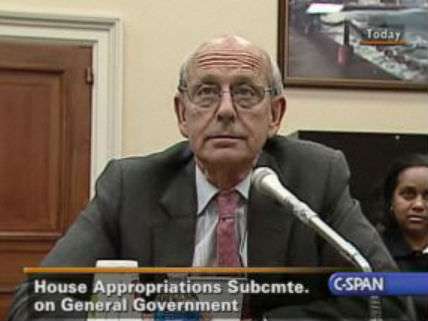Supreme Court Says Texas Ban on Confederate Flag License Plates Does Not Violate First Amendment
"When government speaks, it is not barred by the Free Speech Clause from determining the content of what it says."
In a 5-4 decision issued today, the U.S. Supreme Court held that the Texas Department of Motor Vehicles Board did not violate the First Amendment when it refused to create a specialty license plate bearing an image of the Confederate flag.
The case of Walker v. Sons of Confederate Veterans originated in 2009 when the nonprofit group Sons of Confederate Veterans, Texas Division, sought to sponsor a speciality license plate under a state program which generally allows nonprofits to submit their own designs. But the Texas Department of Motor Vehicles Board refused this particular application, arguing that "a significant portion of the public associate the confederate flag with organizations advocating expressions of hate directed toward people or groups that is demeaning to those people or groups." In response, the Sons of Confederate Veterans filed suit, charging the state with violating the First Amendment to the U.S. Constitution.

Today the Supreme Court ruled in the state's favor. "When government speaks, it is not barred by the Free Speech Clause from determining the content of what it says," declared the majority opinion of Justice Stephen Breyer. Because license plates are not "public forums," Breyer maintained, the state is free to exclude whatever messages it deems offensive. "Just as Texas cannot require [the Sons of Confederate Veterans] to convey 'the State's ideological message,'" Breyer wrote, the Sons of Confederate Veterans "cannot force Texas to include a Confederate battle flag on its specialty license plates."
In a surprising twist, Breyer's majority opinion was joined not only by his three fellow liberal justices, but also by conservative Justice Clarence Thomas. To say the least, it's not everyday that you find Thomas, Breyer, Ginsburg, Sotomayor, and Kagan comprising a majority bloc.
Writing in dissent, Justice Samuel Alito, joined by Chief Justice John Roberts and Justices Antonin Scalia and Anthony Kennedy, accused the majority of taking "a large and painful bite out of the First Amendment."
According to Alito, Texas has converted "specialty plates into little mobile billboards on which motorists can display their own messages. And what Texas did here was to reject one of the messages that members of a private group wanted to post on some of these little billboards because the State thought that many of its citizens would find the message offensive. That," Alito concluded, "is blatant viewpoint discrimination."
The Supreme Court's opinion in Walker v. Sons of Confederate Veterans is available here.


Show Comments (83)